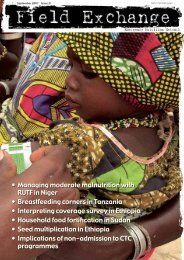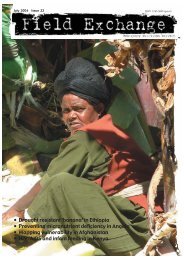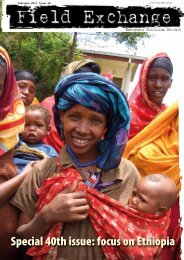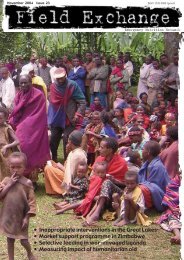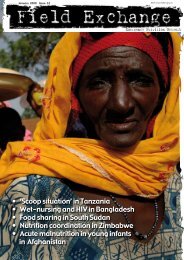Download a PDF of this issue - Field Exchange - Emergency ...
Download a PDF of this issue - Field Exchange - Emergency ...
Download a PDF of this issue - Field Exchange - Emergency ...
You also want an ePaper? Increase the reach of your titles
YUMPU automatically turns print PDFs into web optimized ePapers that Google loves.
Research<br />
Box 1: Malawi National Tuberculosis Control programme<br />
The experience <strong>of</strong> integrating operational research<br />
within the Malawi National Tuberculosis Control<br />
(NTP) programme is an example <strong>of</strong> how research<br />
elements can be successfully built into a national<br />
programme, and be <strong>of</strong> great value in shaping policy<br />
and practice.<br />
Between 1996 and 2004, many studies were<br />
designed, planned, and budgeted within the NTP.<br />
The programme invested in a full-time operationalresearch<br />
<strong>of</strong>ficer and a data-management <strong>of</strong>ficer who<br />
worked alongside the programme manager and<br />
provided on-the-job training and supervision <strong>of</strong><br />
research. Planned and continuing programmatic<br />
research was always an agenda item at the regular 6-<br />
weekly programme management group meetings.<br />
The NTP held an annual scientific review and dissem-<br />
The study question must be <strong>of</strong> importance to<br />
programme implementation for ‘buy in’. Much<br />
<strong>of</strong> the internationally published research done<br />
in Africa has been generated by academic institutions<br />
and researchers, predominately<br />
reflecting their interests or based around basic<br />
science or questions <strong>of</strong> intervention efficacy.<br />
Although useful, <strong>this</strong> type <strong>of</strong> research needs to<br />
be balanced by increasing the work done by<br />
operational organisations (e.g. non-governmental<br />
organisations (NGOs)) that will have<br />
different perspectives. Different actors will<br />
naturally have comparative advantages for<br />
particular kinds <strong>of</strong> research that can benefit<br />
programmes. For example, an academic institution<br />
might be best placed to design and<br />
implement a randomised clinical trial or a<br />
vaccine study, whereas an implementing organisation<br />
might be best suited to take the lead in<br />
feasibility and acceptability studies. If research<br />
is disconnected from health-service delivery<br />
with little or no input from programme staff in<br />
the research design and process it may be being<br />
resented as an additional and <strong>of</strong>ten unwanted<br />
extra on existing busy and <strong>of</strong>ten overburdened<br />
services.<br />
Enabling factors and challenges<br />
Factors that enable operational research and its<br />
translation into policy and practice include:<br />
• Research questions are generated from<br />
within programmes<br />
• Research planning, agenda setting, objectives,<br />
targets, and budgeting are included within<br />
programme plans and as agenda items in<br />
programme management meetings<br />
• Research projects use simple designs and are<br />
focused to answer implementers’ questions<br />
• Close collaboration and partnership has<br />
been established between researchers and<br />
programme managers<br />
• Research is done within existing systems<br />
and not done in parallel<br />
• A competent research <strong>of</strong>ficer works alongside<br />
the programme manager<br />
• Training, mentorship, and on-the-job supervision<br />
is sustained over time<br />
• Sufficient programme capacity exists to host<br />
workshops, present, and discuss research<br />
findings, and ensure their translation into<br />
policy and practice<br />
• Programme staff have access to scientific<br />
literature through subscribed journals or the<br />
internet<br />
• Sufficient numbers <strong>of</strong> programme staff are<br />
available with the capacity to do operational<br />
ination meeting, and operational-research findings<br />
were presented by local and international investigators<br />
to all stakeholders. A medical editor was<br />
recruited to give an annual workshop on paper writing<br />
skills and on how to get the research published.<br />
All publications in national and international journals<br />
were collated each year, and the resulting booklet<br />
was distributed to health-care workers around the<br />
country at national meetings and during supervision<br />
so that everyone had potential access to the results<br />
<strong>of</strong> locally generated research. All these components<br />
were built into the NTP plans with explicit budget<br />
streams, and these helped to develop the capacity to<br />
ask pertinent questions and to carry them through<br />
to publication for dissemination.<br />
research, write up manuscripts, and publish<br />
relevant research<br />
• Funding for applied research is available<br />
and individuals develop a desire to participate<br />
in research and are mentored<br />
• NGOs and other stakeholders are recognised<br />
and have a contributory role in operational<br />
research<br />
• Good quality, appropriate, and relevant<br />
research gets translated into policy and<br />
practice and thereby has a spin-<strong>of</strong>f effect to<br />
stimulate more research<br />
One challenge is that foreign academic institutions<br />
<strong>of</strong>ten have the funding, time, and<br />
mandate for research and thus the associated<br />
power in decisions about what gets done. Local<br />
institutions should also be supported with<br />
money and staff for operational research, thus<br />
allowing them the necessary independence to<br />
make decisions, take responsibility, and establish<br />
partnerships that are more equal in<br />
resources and decision-making power.<br />
The authors suggest building a research<br />
agenda into district and national programmes,<br />
based on local needs, but primarily reflecting<br />
the research priorities <strong>of</strong> the country. Within a<br />
country, it is important to have a coordination<br />
mechanism to provide a clear strategy <strong>of</strong> who<br />
sets research priorities and how choices are<br />
made at national level.<br />
A bibliographic analysis <strong>of</strong> tuberculosis<br />
research done globally between 1997 and 2006<br />
showed that Africa, which has the highest<br />
tuberculosis case rate burden in the world,<br />
contributed only 7% <strong>of</strong> global research output.<br />
Local programmes have a tendency to<br />
outsource research to academic institutions,<br />
which then set up parallel research systems or<br />
affiliated sites. Although <strong>this</strong> might be a highly<br />
efficient means to produce quality research and<br />
scientific publications, if there is no satisfactory<br />
mechanism for integration, collaboration, and<br />
communication with the programme, <strong>this</strong><br />
approach might hinder the development <strong>of</strong><br />
operational-research capacity by drawing<br />
national researchers away from national<br />
programmes. Furthermore, because research<br />
institutions and technical agencies (either international<br />
or national) normally have no mandate<br />
or responsibility for implementing research<br />
findings after their studies are completed, the<br />
results <strong>of</strong>ten end up being sent or presented to<br />
busy programme managers, who have no<br />
ownership <strong>of</strong> the research and who are therefore<br />
unlikely to direct the effort needed to translate<br />
the research into policy and practice.<br />
A change to a partnership model would<br />
enable greater involvement, co-ownership, and<br />
responsibility <strong>of</strong> programme staff along with<br />
researchers and policy makers. For example,<br />
the research question should be developed by<br />
the entire team, including those involved with<br />
questionnaire development, collection and<br />
analysis <strong>of</strong> data, and dissemination <strong>of</strong> the<br />
results. Planning at <strong>this</strong> stage also requires a<br />
clear engagement with the people who make<br />
decisions on policy so that they are aware <strong>of</strong><br />
what is being asked, supportive <strong>of</strong> the research,<br />
and interested to learn about the findings.<br />
Capacity and time for research activities, such<br />
as writing study protocols or dealing with peer<br />
review are <strong>of</strong>ten lacking within most programme<br />
settings but are essential to see research to<br />
completion. However, if they are planned as an<br />
essential part <strong>of</strong> the programme, they can be<br />
accomplished (see Box 1 for an example).<br />
The failure to publish research is not just<br />
confined to the low-income countries: a recent<br />
report found that only 53% <strong>of</strong> 79 research studies<br />
reported in conference abstracts were<br />
published in peer-reviewed journals after nine<br />
years. Common reasons for so-called research<br />
‘waste’ include the wrong choice <strong>of</strong> research<br />
question, poorly designed studies, and failure<br />
to publish relevant research promptly or at all.<br />
There is a perceived need to create a socalled<br />
critical mass <strong>of</strong> trained researchers<br />
within health programmes to ensure that sufficient<br />
numbers <strong>of</strong> researchers continue in post to<br />
sustain future research. The Japanese Research<br />
Institute <strong>of</strong> Tuberculosis, the Japanese<br />
Foundation for AIDS Prevention, the<br />
International Union Against Tuberculosis and<br />
Lung Disease, and the US Centres for Disease<br />
Control and Prevention are among some <strong>of</strong> the<br />
institutions that support international training<br />
on operational research.<br />
There is also a need to assess whether<br />
current capacity-building initiatives are having<br />
an effect, such as tracking personnel after training<br />
(e.g. through databases) to document the<br />
outcomes, explore any barriers, and capture<br />
suggestions for improving the situation. Many<br />
researchers from low-income countries, even<br />
after obtaining PhDs, do not take up research<br />
when working back in disease-control<br />
programmes. This might be because they end<br />
up in senior-level management posts, the infrastructure<br />
to plan or do research is lacking, or<br />
there are simply no opportunities<br />
Creating opportunities<br />
There are various ways in which these opportunities<br />
could be created. First, small grants could<br />
be <strong>of</strong>fered to pursue locally applied research.<br />
Second, junior and senior operational research<br />
fellowships could be created for colleagues in<br />
low-income countries with active mentoring by<br />
international researchers, institutions, or<br />
NGOs.<br />
Bureaucracy should be kept to a minimum<br />
with the main focus on deliverable outcomes<br />
that would include publications with specific<br />
1<br />
Zachariah et al (2009). Operational research in low-income<br />
countries: what, why, and how? The Lancet Infectious<br />
Diseases, Volume 9, Issue 11, Pages 711 - 717, November<br />
2009<br />
19



